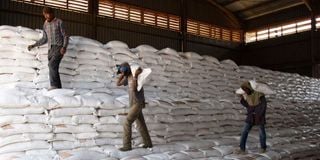Premium
Red tape prevents farmers from accessing subsidised fertiliser

Workers arrange bags of subsidised fertiliser at the National Cereals and Produce Board depot in Elburgon, Nakuru County in this file photo.
The government has been urged to end bureaucracies in the distribution of subsidised fertiliser to enable more farmers to access the all-important farm input.
According to Meru Central Coffee Cooperative Union (MCCCU), their efforts to acquire subsidised fertiliser for their 98,000 members failed due to barriers in the government.
Speaking during a meeting with officials from the Kenya Export Promotion and Branding Agency (Keproba) on Wednesday, MCCCU Chief Executive Officer Joseph Kiogora said the union was forced to purchase fertiliser at higher prices from private dealers.
According to Mr Kiogora, the union was only able to secure 4,000 bags of subsidised fertiliser despite having secured more than Sh100 million in funding to support the inputs credit scheme for coffee farmers.
“We secured the list of farmers and their fertiliser needs and also got approval from the ministry in charge of cooperatives and the Ministry Of Agriculture but could not buy fertiliser from the Kenya National Trading Corporation. We were taken in circles until we ran out of time. We had to buy fertiliser at Sh4,900 per bag from private dealers,” Mr Kiogora said.
He said there was a need for the government to utilise the “bottom-up economic transformation agenda” to revive extension services and research for coffee.
“Besides the barriers faced in acquiring inputs, it is also very difficult for coffee farmers to secure a direct market. Cartels stand in the way of any deal unless the government sets up structures that will safeguard the interests of the farmer,” he said.
Mr Kiogora said the union was supporting farmers by providing quality seedlings, farm inputs and advisory services but there was a need for supplementation from the government.
Mr Eric Munene, an agronomist at the union, said the revival of the Coffee Research Institute, extension services, and value-addition structures was necessary to improve coffee production in Kenya.
“Coffee Research Institute played a critical role in ensuring the health and quality of coffee is maintained. In case of disease or pest outbreak, they could swiftly prescribe a cure. But recently, a farmer lost the entire two-acre coffee bush to disease because we could not establish the disease,” he said.
“Currently, farmers are at the mercy of input dealers because of the collapse of government extension services. This affects the quality of coffee produced.”
Keproba pledged to support the coffee union in promoting its products in external markets including during the upcoming trade mission in the Gulf region.





